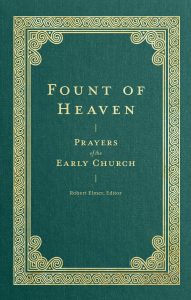Fount of Heaven: Prayers of the Early Church (Lexham Press)
Robert Elmer, ed.,

Book Review
As a young Christian in the free church tradition, I was taught that written
prayers were formalized and impersonal. Spontaneity was considered the
mark of appropriate prayer. I still believe in spontaneous prayer, but I also
believe in the importance of writing prayers in order to achieve precision and
reading prayers in order to be enriched by the saints of old. Throughout
Christian history, prayers have been preserved, honored, and even translated
into multiple languages. The New Testament itself contains prayers, of course,
but the early centuries of the church also provide riches of devotional,
theological, and instructional substance and encouragement.
This book will be of particular interest to preachers, and for a dual purpose.
First of all, the preacher’s own soul will be fed by reading these prayers, and
by praying them. The reader will be drawn into the experience of prayer even
by reading these prayers. Secondly, our preaching, as well as our praying, is
enriched by following the flow of thought of Christians of old as they bring their
prayers and praise to Christ for intercession before the throne of God.
One of the happy developments in evangelicalism over the last several years
is the recovery of interest in the biblical commentaries, sermons, and prayers
of the early church. Robert Elmer has collected and assembled by theme
many of these prayers for our inspiration and edification.
“I am convinced the original authors would have been pleased to have us
borrow their words for our own prayers. After all, these are not just a window
into the distant past, but a reminder of First Things. And these prayers are
recording what really matters. If it were possible, we would thank our earliest
brothers and sisters for the way they held firmly to faith, and to our Savior,
even in the worst of days. Perhaps we can do a measure of the same
dedication as we pray once more the prayers they prayed.”